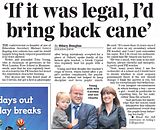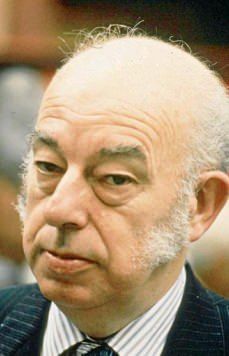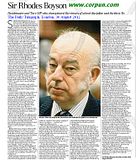|
Corpun file 24094 at www.corpun.com Sunday Express, London, 12 August 2012'If it was legal, I'd bring back cane'By Hilary Douglas
THE controversial co-founder of one of Education Secretary Michael Gove's flagship free schools has said he would happily bring back corporal punishment if he were allowed. Writer and journalist Toby Young, who is chairman of governors of the West London Free School in Hammersmith, says that he was regularly beaten at school by his PE teacher but found the experience character-forming. The 48-year-old, who failed most of his O-levels, but got a first in philosophy after being mistakenly accepted for a place at Oxford, spoke fondly of his former gym teacher, a Greek Cypriot who regularly beat his pupils with a shoe. Young said that despite the teacher's reign of terror, which ended after a pupil's mother complained, the punishment he dished out helped to keep discipline and focus pupils' minds. He said: "It's more than 35 years since I last set eyes on my secondary school PE teacher and I can't now remember his name. But I do recall his nickname, we called him Mr Smack-em-hard-es. "He was a small, wiry man in his midthirties, always cheerful and energetic. A pretty good PE teacher. "Now, many years later, I am the co-founder of a school and I would have to decide whether to allow corporal punishment there if the law should change. I think the answer is yes, but only for exceptionally bad behaviour. "I can imagine circumstances in which beating a boy -- never a girl -- would be preferable to expelling him, for his sake, rather than the school's. "And perhaps the knowledge that the school could administer this ultimate punishment would stop the pupils from behaving too badly." Corpun file 24100 at www.corpun.com
The Daily Telegraph, London, 30 August 2012ObituariesSir Rhodes BoysonHeadmaster and Tory MP who championed the virtues of school discipline and the three Rs
Sir Rhodes Boyson, the former Conservative MP for Brent North, who has died aged 87, performed for his party a similar function to that of John Prescott in the Labour Party -- reminding the grass roots that, however far its leadership deviated from the "True Path", the party's heart was still in the right place. A former headmaster with Dickensian mutton chop whiskers and gold fob watch, Boyson was an old-fashioned figure with trenchant views on the three Rs, morning assembly and the cane (among his claims to fame, he was the only white man ever to have beaten Frank Bruno, a former pupil). He and his Labour counterpart Prescott had much in common. Both tended to be sneered at -- Boyson's fellow MPs called him "Wackford Squeers"; both had a rather tortured relationship with spoken English, yet somehow managed to communicate meaning (Boyson with a strong Lancashire accent) while not always making literal sense; both had an instinctive grasp of grass roots prejudices and gave them voice; and both were sell-out attractions on their respective conference fringes. Boyson knew what his audiences wanted to hear and gave it to them. He campaigned vigorously for privatisation (including universities and the NHS), for lower taxes, for patriotism, the death penalty, corporal punishment and the teaching of Greek and grammar. He campaigned against unmarried mothers and sexual "deviants", welfare scroungers, sex education and (latterly) Europe. Some of his colleagues thought him barmy, but he did not mind. "If you go into politics," he said, "there's no point being over-sensitive." Boyson came into politics with a solid record of achievement, having distinguished himself in his previous incarnation as a highly successful head of a large London comprehensive. A convert from old-fashioned socialism, he worked as a foot-soldier in the Thatcher administration for eight years before being, as he put it, "blackspotted" -- as a junior minister at Education, Social Security, Northern Ireland and Environment. Some felt that if he had been made Education Secretary in 1986, succeeding Sir Keith Joseph, British schools might have been spared some of the more disastrous education reforms of the subsequent years, and they blamed the innate snobbery of the Tory establishment for Boyson's failure to progress to Cabinet rank. Boyson was an affable man without a trace of malice who always got on well with those who worked for him; but the truth was that he was always a better propagandist than he was a minister. Trusting always in his (trenchantly expressed) gut instincts, he had little taste for the intricacies of policy analysis or the inevitable compromises of office. Rhodes Boyson was born on May 11 1925 at Haslingden, in Rossendale, Lancashire. His father, William, was a cotton-spinner, Methodist and self-taught socialist who went to prison as a conscientious objector during the First World War; later he became a Labour councillor and union official. As a child, Rhodes was brought up on Left Book Club texts, self-help and Christian Socialism. The family lavatory was a waste water "tippler" at the end of the yard, complete with a 15ft drop. The highlight of the year was the annual trip to a take-your-own-food Blackpool boarding house. "There are people in the Labour Party," Boyson once remarked "who would give £10,000 for my background." Rhodes got an early lesson in the efficacy of strict discipline on his first day at primary school. Discovering that he could read but could not "number", his teacher "thumped" him for 10 minutes -- "and by God, I numbered within a week". Although he failed his Eleven Plus, an aunt who ran a chip shop paid for him to go to Haslingden Grammar School, which he left to serve in the Navy at the tail end of the war. While in uniform, he enrolled at University College, Cardiff, where he took a degree in Greek and Philosophy. In 1950 he became a teacher and, five years later, headmaster of Lea Bank School, a secondary modern in Rossendale. Two years later he followed his father on to the local council, representing Labour. As a headmaster, Boyson distinguished himself by introducing exam courses (before the CSE was introduced) complete with prize-giving ceremonies, and somehow managed to fit into his spare time a master's degree (at Manchester University) and a doctorate on the 19th-century Lancashire cotton industry. Later he took a schoolmaster fellowship at Corpus Christi, Cambridge, where he researched the life of Henry Ashworth, the enlightened Victorian cottonmaster, free-trader and fellow Lancastrian. In the early 1960s Boyson moved to London, where he became headmaster of Robert Montefiore School, an East End secondary modern with Christian, Jewish and Muslim pupils. He solved the problem of multi-faith assemblies by agreeing with local religious leaders on "12 hymns which were basically all in praise of the one God". His teaching career culminated in the headship of Highbury Grove, a newly formed comprehensive to which he brought some of the rigours and disciplines of the old grammar school. It was there that he grew his mutton-chop whiskers as his side of the bargain with his sixth formers, who promised in return to cut their long hair. His enthusiasm for physical discipline, a hallmark of his political career, was honed at this time. When a boy climbed on to the school roof, Boyson recalled: "I climbed the drainpipe, collected the boy and we came down the drainpipe together. I held him by various parts of his anatomy, thumping and kicking him all the way down." When a group of girls was found smoking in the school lavatories: "I instructed my caretaking staff to obtain lengths of fire hose and connect these to the water hydrants." Cigarettes and girls were duly extinguished.
When a boy expelled from another school arrived and threatened to cause trouble, Boyson remembered, "I had the boy caned as an initiation ceremony and informed him to his great amazement that he was now a Highbury Grovian." The parents loved it, and Highbury Grove became the most oversubscribed school in London. By this time, however, Boyson had become disillusioned with socialism and its commitment to comprehensive education. In 1964 he switched allegiance to the Conservative Party, and in the 1970s was co-editor of the "Black Papers", which attacked the progressive educational ideas that had taken hold since the war. Many of his ideas, such as the national testing of schoolchildren at certain ages, were later to become official Tory policy. Boyson stood unsuccessfully at Eccles in the 1970 general election, but in February 1974 was returned as Conservative MP for Brent North with an 8,000 majority. He emerged as a rumbustious and effective figure on the backbenches, and in Opposition Margaret Thatcher appointed him to work on education policy under Norman St John-Stevas. The two did not get on, St John-Stevas referring to Boyson, ironically, as "the Colossus of Rhodes". In 1978 Boyson published a book advocating a 25 per cent cut in public spending, the liquidation of state aid to industry, getting rid of nationalised industries, a minimal welfare state, the scrapping of trade union privileges and the end of immigration except for refugees. He was not a man for half measures. After the Tory victory in 1979 he was appointed higher education minister, then schools minister under Sir Keith Joseph, but failed to make any progress on his aim of pushing back comprehensivisation, which he considered particularly unfair on "able working-class boys". He was shuffled to the Department of Health and Social Security in 1983 and again in rapid succession to the Northern Ireland Office and then the Department of the Environment. But he returned to the back benches in 1987, when he was knighted and sworn of the Privy Council -- inadequate consolation prizes, in Boyson's view, for the loss of office. Like many on the Right of the party, Boyson voted for John Major in the 1990 leadership election that followed Margaret Thatcher's resignation. Inevitably, he became a member of the awkward squad, voting against the government 12 times during the passage of the Maastricht Bills and calling for "a mandatory referendum of the British people to say Yes or No to what is decided... and whether we remain in the European Community". Boyson was a good constituency man but lost his seat in the 1997 Labour landslide. He refused to be downhearted, and gamely continued to pursue his Who's Who hobby of "inciting the millennialistic Left in education and politics". His memoirs, Speaking My Mind, were published in 1995. Rhodes Boyson married first, in 1946, Violet Burleston, with whom he had two daughters. The marriage was dissolved, and he married secondly, in 1971, Florette MacFarlane. Sir Rhodes Boyson, born May 11 1925, died August 28 2012 © Copyright of Telegraph Media Group Limited 2012 |
About this website |



